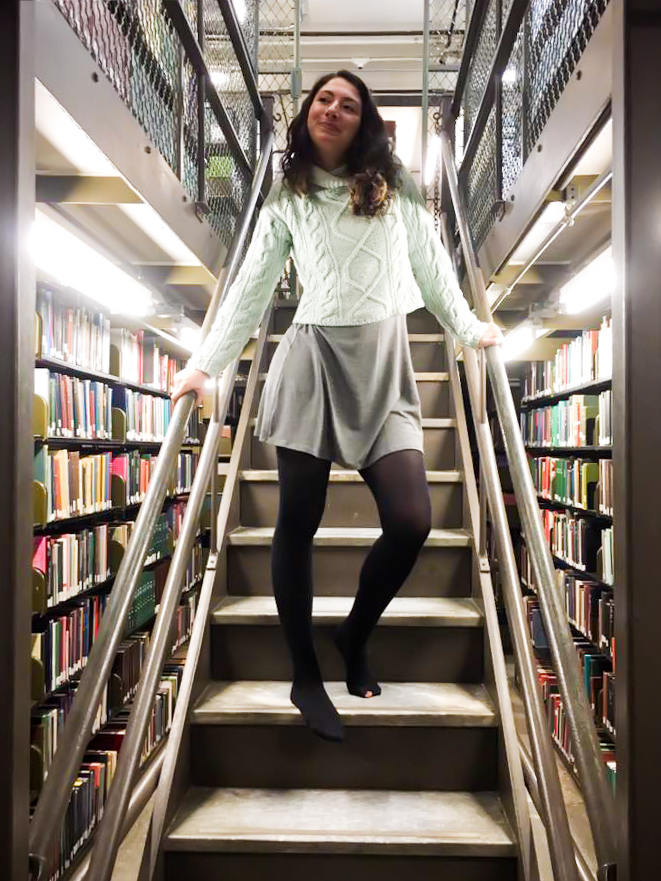
c/o Lizzie Shackney
You might know her from her frequent WSA emails, but there’s more to Lizzie Shackney ’17 than you see in your inbox. Shackney has spent her time at the University forming strong bonds over Usdan lunches, late-night dares, and, everyone’s favorite, the amusingly awkward icebreaker at the start of a group meeting. The Argus caught up with Shackney to reflect on her time on campus and share some advice to future generations.
The Argus: Why do you think you were nominated as a WesCeleb?
Lizzie Shackney: Well, I send a lot of emails. And I’ve been involved in the WSA since my freshman year. And then I’ve just made a lot of friends in a lot of different areas on campus.
A: Do you send a bunch of emails for groups you’re involved in? Have you made friends through all your activities or your coursework?
LS: I send a lot of all-campus WSA emails. I sent a great fire safety email at the beginning of the year. I also sent…I don’t need to, like, list all my emails. You can just look in your inbox. Sometimes they’re really embarrassing. I sent one about menstrual products, and I didn’t realize that it also went to faculty and staff.
And then friends…I don’t know, I guess that’s through involvement in different things, and caring about what goes on around this campus. I like getting lunch with people, and I like getting to know new people. And I like being really weird when I’m out on the weekends. So I think anything like that ends up helping me make new friends.
A: What constitutes being weird when you go out on the weekends?
LS: Just like coming up with an agenda. I need to spice it up somehow. I don’t want to give away all my secrets. It usually involves some sort of scheme, or dare, or something like that. It’s more than just going out and seeing people. It’s like making people do something.
A: Do you yourself carry out the dare?
LS: It’s usually a joint effort. A team kind of thing, someone you can recruit. It’s not fun to do alone.
A: Is there one you specifically remember?
LS: One time we dared someone to put their pants in the freezer. One time at a party, I made people stand around in a circle and introduce themselves with their name, where they’re from, and their favorite ice cream flavor. And these were a bunch of strangers, and nobody wanted to do it. That’s what made it so funny. I love icebreakers. They build teams, they build communities. I often lead the icebreakers for the entire WSA.
A: How many people is that?
LS: Thirty-five.
A: Oh wow, so you can make thirty-five people do that?
LS: Yeah. I try not to make them too uncomfortable, but you do have to be a little uncomfortable to connect with people, I think. I’m trying to think of my favorite icebreakers…have you ever played the vegetable game?
A: No, what’s that?
LS: Everyone comes up with a vegetable, and you have to put your lips over your teeth, and you say your vegetable, and you pass it on to someone, and then they have to do the same thing. But you’re not allowed to smile, and you’re not allowed to show your teeth, and you’re not allowed to laugh.
A: And you said you like getting lunch with people—are you a Usdan lunch person?
LS: I love Usdan lunch. I will always love Usdan lunch. And I love the accessibility of the crossword puzzle in Usdan. I love checking my mailbox, and even more than that, I love getting mail.
A: What’s your favorite Wesleyan memory?
LS: In the fall, there was a dance showcase—I love all the dance showcases, I love seeing all these different groups expressing themselves. So there was a dance showcase, I was loving it, and it started raining, and everyone left. And then it was just a few of my friends and I left in the rain, and there was a stage. So we danced on the stage, which is so cliché and stupid, but it was so liberating and nice to be with these people who I’ve been friends with since freshman year.
But I think my favorite experiences…I don’t know, there are so many. But it hasn’t been all good, and I think that that’s important to include, because a lot of it has been really hard. But there have been good moments.
A: Do you think that the hard moments—do you think you can look back on some of them fondly, even though they were challenging?
LS: I don’t know, they were kind of debilitating. But I don’t think I could’ve felt as happy and as grateful for everything else if I hadn’t been pushed by very difficult things.
A: Do you have any parting wisdom?
LS: My parting wisdom is to…I tell people that I wish I had done more art, and danced more, and acted more. Just because I feel like those are…those things can be a lot more inaccessible in the real world. And here, there’s a lot of flexibility to make art. And the artistic experiences that I’ve had here have been meaningful. I just wish there had been more of that. I don’t know if that’s sufficient parting wisdom. A lot of my parting wisdom would be for myself.
A: Like what?
LS: Like I’m very bad at gauging how well I’m doing, and that I’m probably better than I think I am. And I think that applies to a lot of people who I’ve heard express a lot of doubt in themselves. I think that’s the big one, that you are better than you think you are. Unless you think you’re really great, then you’re probably worse than you think you are.